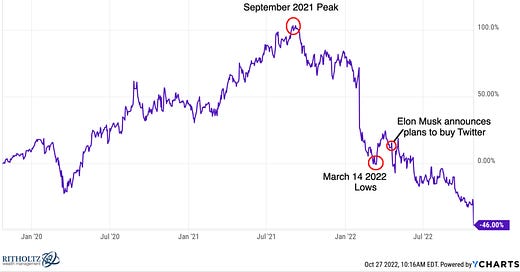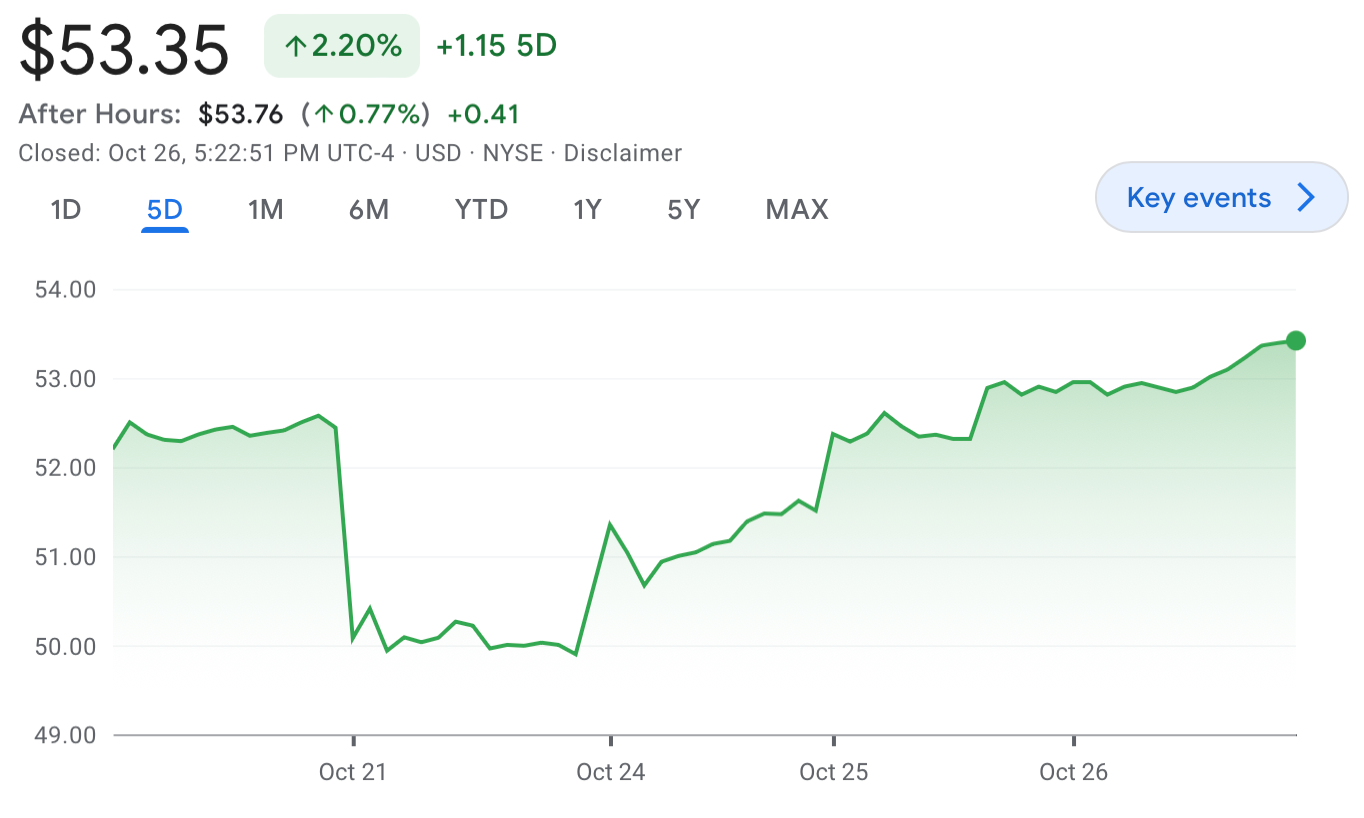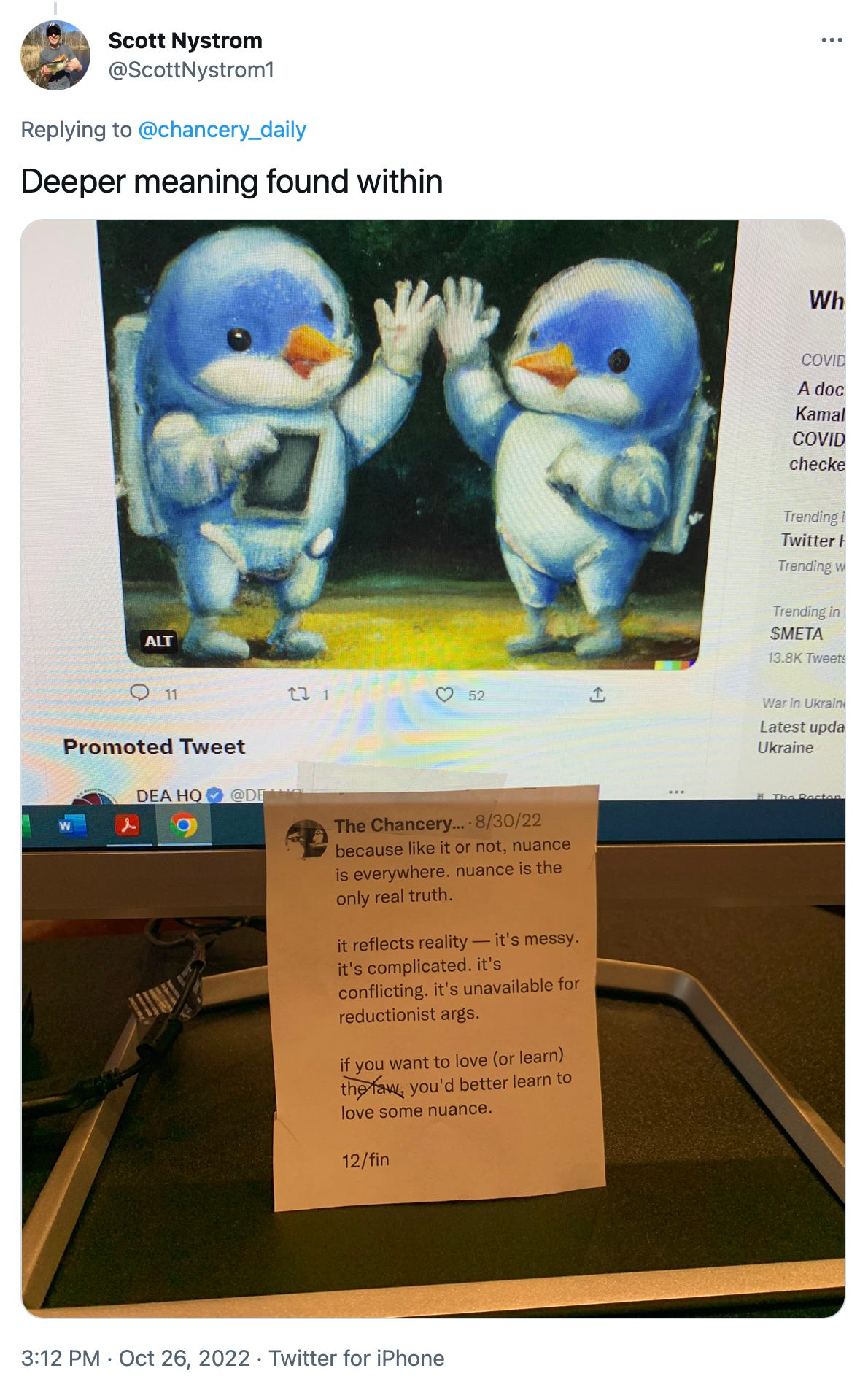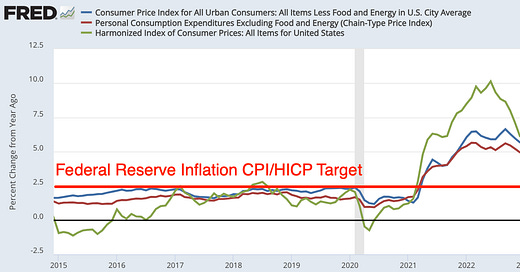
CONDITION: Self-Driving Twitter:
The chaos-monkey action is strong with this one: apparently Elon Musk is buying Twitter, expecting that it will be able to drive itself:
CONDITION: The Economy Remains Very, Very Strong:
Third-quarter real GDP growth at a 2.6% annual rate, and core PCE inflation at a 4.5% annual rate—in the late-Volcker or early-Greenspan years, these would have been seen as perfect numbers for an economy near full employment…
FIRST: Wait! What? What just happened to Facebook?:
The news:
Sofia Pitt: Meta stock falls 23% on earnings miss, analyst downgrades: ‘Cowen’s John Blackledge also downgraded Meta to market perform… lowered… price target to $135 from $205…. KeyBanc’s Justin Patterson… sector weight from overweigh…. Since the start of the year, Meta… down… 61%…. TikTok… slowdown in online ad spending… Apple’s iOS privacy…
The perspective:
Barry Ritholtz: Meta-Four: ‘We discussed how ephemeral and short-lived great success can be yesterday…. I had no idea it was a metaphor for what would happen a few hours later… [to] Facebook…. FB does not have all that durable of a grip on its user base…. [Thus] META’s moat is far shallower and narrower than that of other FAANGM firms…. META… had already fallen 50%… [by] mid-March…. Ben Carlson points out that “Facebook’s market cap has declined by ~$800 billion since then… greater than the current market cap of every company in the S&P 500 save for Apple, Microsoft, Google & Amazon….
Musk, he is not someone you want to be competing with… disruptive, innovative, and capable of thinking way, way outside the box…. Tesla shareholders… [fear a] shiny object distracting Elon…. Facebook shareholders… realizing… in addition to TikTok… they have another social media competitor fighting them.
Zuck’s sketchy respect for its user data or privacy that was once the firm’s greatest source of profits…. Facebook’s business model was t-boned by Apple… [not] fatal… but nobody walks away… when a vehicle that large plows into you. TikTok stealing users, Apple breaking their magic data source for advertisers, and now… an unpredictable but brilliant competitor…
And the rant:
Ed Citron: Mark Zuckerberg Is Going To Kill His Company: ‘In the most charitable interpretation… [Zuckerberg’s] company [has] grow[n] from “catch up with what your friends are up to!” t… discordant… algorithms… trick[ing] you into doing stuff…. Instagram and Facebook… use their users… your feed… sifting through cat litter for… nuggets…. You increase active users yet decrease revenue… by turning your previously-beloved social networks into social engineering traps. Meta has… taken two products… people liked… and, in their desperation, tried to wring more money out of them by annoying their users into submission….
Zuckerberg’s metaverse, one of the stupidest things I have ever seen a company pursue…. As funny as it is that Zuckerberg responded to “don’t spend as much money on the metaverse” with “I will now spend more on the metaverse,” anybody with half a brain can see that he is burning his company to the ground… peak founder-brain…. $15 billion… without it being immediately obvious where that money went or why it went there. We do know where some of it went, though - into Horizon Worlds, a subpar virtual reality platform that barely anybody uses or likes…. No excuse… awkward, bad and ugly…. [The] company… [has] an abundance of resources… “great minds”… the ability to hire almost any engineer….
A mismanaged corporate behemoth run by a clueless goon that has been running on empty…. Profitable metaverses… are… video games. Had Zuckerberg, say, acquired Second Life, and then used billions of dollars to turn it into a rich, customizable world run either in a browser or on a computer, that would have made a great deal more sense. Except… Zuckerberg… [lacks] the humility, awareness or experience of the world he’s creating products for to reliably know what people want, or might want, or will ever want…. [A] likely… slow decline… as people flee these platforms, with investors… calling for Zuckerberg’s head as he burns $15+ billion a year trying to prove that the world wants to chat to Wii avatars…
There is one thing I would want to stress:
There is a HHHUUUGGGEEE difference between a company as a profit-making entity on the one hand, a company as a productive entity on the other hand, and a company as an influencer entity—as something that changes our lives and our society—on the third.
To date Elon Musk’s enterprises have been unsuccessful as profit-makers, pathfinders as producers, and are highly likely to change the world for all of our great good on the third—and, yes, I do think he is an unpredictable and highly erratic chaos monkey. But he has not thrown away his shots. And people have willingly given him enough ammunition that a number of them have been world-benefitting bullseyes.
By contrast, Zuckerberg’s enterprises have been unbelievably and extravagantly successful as profit-makers, valuable at start but increasingly annoying as producers, and as influencers—well, some people just want to watch make the world burn.
Perhaps Facebook is almost over as a profit-making entity. That is what Ms. Market fears, as she assesses the danger that it may get caught between Tim Cook and Elon Musk and ground into dust, But Facebook on its way to irrelevance still could spread a lot of accelerants and throw off a lot of sparks with respect to its effects on society.
And do not forget this: Even though, to date, Elon Musk has been very good for the world (and has been good for his investors only to the extent that they have been able to sell to others who even more completely buy his dreams), there is no guarantee that his Self-Driving Twitter will be an equal boon for humanity.
It is odd: I have a strong sense that in the First Age of IT all the profits went to IBM, in the Second Age all the profits went to Wintel and thus to Microsoft and Intel, and in the Third Age all the profits went to Google, Facebook, Amazon, and Apple, Intel, and lately TSMC. I do not have a strong sense about which of these companies’ being there—and other companies—did more to change who we are and how our society works.
Shouldn’t I have one, this far into the information age?
One Video: On Claiming That Not Liz Truss But the Bank of England Is the Chaos Monkey Here
Gillian Tett: Jacob Rees-Mogg is talking bollocks:
One Image:
Oþer Things Þt Went Whizzing by…
Very Briefly Noted:
Stephanomics: Biden's Pro-Union Presidency Isn't Good Enough for Union Members: ‘Reporter Katia Dmitrieva provides a dispatch from the traditional union stronghold of Macomb County, Michigan…
Marcy Wheeler: John Durham’s Investigation Has Disclosed Corruption: His Own…
Feminine Chaos: Your Privilege Is Showing, Coffee Husband Edition: ‘“This website is sooooo healthy…
Martin Peers: On Metaverse Spending, Zuckerberg Doesn’t Care What Critics Say: ‘Not only is he not cutting back on augmented and virtual reality investments to take account of the economic slump, he plans to spend even more money!… Nearly $15 billion, well above the $10 billion annual figure…. Moreover, the losses will “grow significantly”…
Nils Gilman: How to be Interdisciplinary: ‘The core of interdisciplinary work is disciplinary expertise…. “Post-disciplinary”… leads all too often to mere dilletantism…. Effective interdisciplinary teams consist of disciplinary experts, but ones… who also have an inclination to and knowledge of how collaborate with experts from disciplines other than their own…
Jeff Stein: Russian Army’s Quiet Fatal Flaw: No Sergeants…
Derek Thompson: How the U.K. Became One of the Poorest Countries in Western Europe: ‘Britain chose finance over industry, austerity over investment, and a closed economy over openness to the world…
¶s:
Gillian Tett: Billionaires Obsessed with Bunkers”: ‘They feared the world was heading for what they termed “The Event”…. They wanted to know which region would be safest to retreat to…. Increasing numbers of private individuals… prepping for disaster…. No billionaire on their own can fix the catastrophic risks of climate change, pandemic or war. We need collaborative action between the public and private sectors. So let us hope that today’s swelling mood of fear will shock us all…
Jemima Kelly: The problem with social media is that it is not a real place: ‘For too long digital platforms have said they are not responsible for what they publish…. I had one especially aggravating episode a couple of weeks ago, having agreed to speak at a bitcoin conference. After using the verbal filler “like” too much during one particularly combative segment of my panel, I was summarily turned into various memes and video montages that totally clogged up my notifications for about 36 hours. There was the usual name-calling and trolling, but also some nastier than usual tweets and messages calling me the kind of offensive and misogynistic things that I can’t repeat here, and one that suggested I should die by suicide. I was aware that the people attacking me had a huge financial incentive to invalidate my criticisms, so that helped me to not take any of it too seriously. I even found some of the memes funny. But after a while, the sheer weight of negativity began to fill me with gloom about the number of people prepared to be so vile on the internet.… If we want to stop the internet becoming either a desperately bland or perfectly horrible place, we need to start treating it as somewhere we would be happy spending time in real life. That includes imposing moral and social consequences for behaving like an idiot…
Drake Bennett: Can a Site Like Mastodon Solve a Problem Like Twitter?: ‘Whether… [it] solves the problems… depends…. If the problem is the annoying Wendy’s ads in your feed, then yes. But if it’s the hostility and rage and oversimplification and bullying and question-begging and smugly self-congratulating tone of much of the content, it may not…. One of the best examinations of the social dynamics of Twitter is an early 2020 blogpost by Venkatesh Rao entitled “The Internet of Beefs.” In the deadpan tone of an anthropologist, Rao describes a sort of feudal society where all interactions are reduced to either displays of solidarity or fights. “Anything that is not an expression of pure, unqualified support for whatever they are doing or saying is received as a mark of disrespect, and a provocation to conflict,” he says of Twitter’s unwritten social code (and, in his argument, that of pretty much the entire public internet). The biggest stars on the platform—e.g., Musk himself—are those who have mastered the art of picking and indefinitely prolonging fights about, well, whatever. The beefing isn’t some unfortunate effect of online life, Rao argues. Increasingly, it’s the point…





















Two things about Facebook:
1) Apple changed the allowable level of PII tracking on the iPhone and this has apparently cratered Facebook's revenue. (this also gave the lie to Facebook's claim that is was only tracking very specific PII it needed to tweak its ad display algorithm - they were clearly trading/selling that info as well)
2) that said, I do use Facebook to keep track of close family, high school friends, and the world of ammeter potterymaking. From about 3 years ago to 12 months ago Facebook was actually showing me relevant, amusing, not-obnoxious ads and I did click through a few of them and make purchases - and I am pretty immune to ads in every form. But 12 months ago Facebook apparently implemented one of its famous "algorithm tweaks" and since then it has been showing me nothing but irrelevant junk ads. No, I don't need a 35-ton hydraulic excavator; what happened to the ads for pottery knives? And I choose that example specifically because Facebook knows I follow pottery sites without needing any data from Apple. I think they outsmarted themselves with their smartest guy in the room software updates and killed their own goose.
Facebook’s willing acceleration of its own collapse into irrelevance (as every other social network has experienced) is absolutely astonishing. Not even content to milk the money on the way down, Zuckerberg is setting it all on fire. Rather than even say he will try to make Facebook more useful, he brags about spending that money on a VR product absolutely nobody has asked for. I have an Oculus headset and the experience is very good as far as VR goes, but I haven’t picked it up and used it in six months because it turns out that VR isn’t all that interesting except as a gimmick. Even for games, it makes you intensely motion-sick for first-person movement. Nobody will want to spend any significant amount of time wearing a headset. Nobody. And without VR, the metaverse is just another avatar chat room, of which there have been dozens already, none terrifically successful.
The badness of the products seems to me the result of the founder’s Vision being incomprehensible to anyone else. I’ve seen that many times but at much smaller scale. Nobody will tell the boss, of course, and they’ll build SOMETHING, but what they build will be garbage because there is nothing coherent to latch onto. Steve Jobs, by contrast, always had something he could describe that people could understand wanting, even if the delivery (especially first versions) was much more limited.
Musk’s secret skill has been finding and hiring those people who have their own vision that is somewhat aligned with his, and letting them rip. My experience at the tech giants is that past the first few thousand employees, the ability to identify those absolutely critical people gets lost, and risks being corrupted into hiring people who are instead completely incapable, and so you see steadily decreasing ability to execute except incrementally or by cloning.
And cloning is great but many companies seem to feel too proud to really go for it. Facebook tried its own version of TikTok but it was never close enough to substitute. The urge to believe you can do better by innovating serves your pride but not the market. Especially once your ability to innovate is fading.
What Musk will do with Twitter, I don’t know. The people I talked to about it pretty much agree you could do it with 75% of the staff. The problem is how to get there from here.